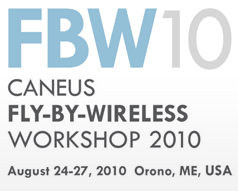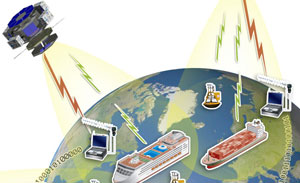
|
||||

To overcome technical and programmatic challenges for small satellite constellation systems and technologies, data gathering, data handling, and data distribution concepts, frequency allocation and bandwidth constraints, legal policies and regulatory considerations, and collaborative framework models. 
Workshop CommitteeWorkshop Co-Chairs
Technical Co-Chairs
On the next newsletter:
The 2010 CANEUS Fly-by-Wireless Workshop will bring together leaders from aerospace industry, academia, and government agencies, to discuss recent advances in wireless communications focused on applications in aerospace industry. The workshop will be hosted by the University of Maine, Orono, Maine, USA, on August 24-27, 2010. |
Global Call-for-Papers LaunchedOver 80 countries Invited to Submit their Input for the CANEUS Shared Small Satellites CSSP (Collective Security, Safety and Prosperity) International WorkshopFrom maritime authorities to non-government organizations to law-enforcement agencies across the world, the international community will gather October 20th, 2010, for the CANEUS Shared Small Satellites CSSP International Workshop in Marina di Carrara, Italy. A global call has been launched requesting papers that will enrich this workshop, dedicated to creating a low-cost internationally shared space-based data collection and distribution network with exceptionally low barriers to entry for participating nations. Organized by representatives from the CANEUS Organization, the ONRG (Office of Naval Research Global), the NRL, the NURC (NATO Undersea Research Center), and organizations representing the Americas, Europe, Asia, and Africa, this international workshop is also co-sponsored by IEEE and ION amongst others. The concept of the Shared Small Satellites CSSP involves a network of simple ground terminals and a constellation of nano-satellites to provide access to the “unwired” places on earth. CANEUS estimates that 84% of the globe—open oceans, Polar Regions, jungles, and deserts—are effectively unwired. The purpose of this constellation is to make data collection from ships at sea and from distributed sensors in locations where conventional communications infrastructure is lacking. Receiving data in real-time from space of activities and conditions in these remote areas underpins responsible control and enhances safety and security for countries worldwide.
Overview
Ultimately, the workshop aims to identify issues for the potential Concept of Operation and international cooperation framework It will also explore the particulars of international technology developments and applications that complement and are enabled by such a capability, so that a comprehensive profile of international impact may be quantified. The workshop deliverables will help formalize an implementation and transition plan for the operational phase of this international, cooperative nano-satellite project. Shared Space Based Communications InfrastructureAt this workshop, we will explore shared communications infrastructure designed to retrieve data from beyond line of sight and in unwired regions for fusion, analysis, and action, , with minimum latency. By using a global constellation, participating nations can collect and share data from the “unwired world” that then can be used to enhance the safety, security, economic development and environmental protection of each sovereign state. Fractional Ownership ModelIn the collaboration model, multinational participants partner to deploy a constellation of relatively inexpensive nano-satellites and a network of small, moveable ground terminals that together create an efficient, persistent communications infrastructure. Partnership is provided in return for investment in the system. Investment may be monetary or in-kind contributions such as launch services or ground station operation. At this workshop, we will analyze several collaboration models that define alternatives for sharing the capacity of the system between the partners and providing services to external subscribers. For example, a Consortium Member country would be entitled to a share of the available bandwidth from the total constellation. The satellites would relay data from that nation’s sensors to a ground terminal (which may be in another country), and from there to an enterprise server (in yet another country, perhaps) for distribution to the country owning the data. That country could then choose to share this information to enhance cooperation with the other constellation partners and / or its neighbors who may not be participating. Workshop ObjectivesThe CANEUS CSSP International Workshop has a unique flow-down format which emphasizes, as its primary deliverable, an international framework for joining the Shared SmallSat undertaking as a stakeholder; the issues, costs and benefits involved; what prospective stakeholders can expect to gain by participation, as well as the potential business model. The CANEUS Shared SmallSat CSSP International Workshop aims to:
To learn more about the workshop, visit www.caneus.org/sharedsmallsatsInviting delegates from the following nations:
|
|||



